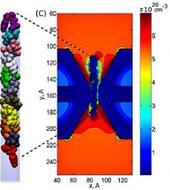IGERT Story
Solid state nanopore technology points to the future of DNA sequencing
Description
Imagine the day when your doctor offers you a test that allows you to look into the future and determine what diseases you may get, enabling early diagnosis and treatment. Sound unbelievable? Researchers in the College of Engineering at Illinois are taking a step in this direction.
Professors Jean-Pierre Leburton (electrical and computer engineering), Aleksei Aksimentiev (physics), and Rashid Bashir (ECE, bioengineering, and PI on the University of Illinois IGERT) are developing solid state nanopore technology that has a wide range of applications, including a potential DNA sequencing solution that could make affordable genome sequencing a reality.
While this technology features many adjustable parameters that will encourage numerous adaptations of this technology, one exciting possibility is its ability to sequence DNA quickly and efficiently. Currently, the cost to sequence a complete human genome is tens of thousands of dollars. With more affordable genome sequencing available, it could become a routine diagnostic test and have significant medical impact.
The team’s solid state nanopore technology creates nanopore devices—using a thin semiconductor, the basic material for nanoelectronics and integrated circuits—that can pull single-stranded DNA and double-stranded (ds) DNA through the nanopores in a controlled manner, and provides for the measurement of critical nanopore parameters associated with specific base pairs or degree of methylation.
Visit the Engineering at Illinois Web site for the full story.






